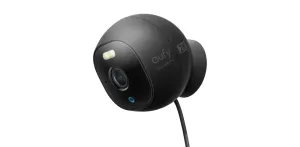First Glimpses: Why Consider the Shift?
Last spring, I realized my trusted old analog security camera system, which had loyally guarded my small backyard workshop for over a decade, was showing its age. Picture this: grainy footage where you'd strain to tell the difference between a raccoon raiding the bins and a mischievous neighbor's kid. That’s when it hit me – it might be time to upgrade to something more… 21st century. Dive into the world of IP (Internet Protocol) cameras, a change that's already reshaping the contours of home security for many folks, myself included.
Swapping your analog system for IP cameras isn't just about hopping on a bandwagon. It’s about embracing technology that offers superior video quality, remote access, and better scalability. If you've been tossing around the idea of upgrading your security cameras, I'm here with a cup of coffee in one hand and years of tech nerding in the other to share what I learned while switching systems.
Analog vs IP Cameras: The Tech Behind the Terms
Understanding the tech can sometimes feel like decoding a secret language. But fear not! Here’s a simplified breakdown:
Analog cameras work by sending a video signal to a DVR (Digital Video Recorder), which then converts it into a digital format to be viewed on the internet or stored. They’re like the reliable old rotary phone – straightforward and effective within its limits.
IP cameras, on the other hand, are the smartphones of the camera world. They send and receive data via a computer network and the internet. Each camera has its own IP address and often comes with higher resolution and more features than its analog counterparts.
.
Crystal Clear Benefits: What Makes IP Cameras Stand Out?
When I started digging into the perks of IP cameras, I was impressed by the jargon-loaded benefits that actually translated into everyday pluses. Here's the lowdown:
- Higher Resolution: We're talking about going from old-school TV quality to crisp, ultra HD. This means clearer pictures and no more squinting to figure out if that’s a friend at your door or someone you should be wary about.
- Accessibility: Ever wanted to check your cameras while on vacation, just for that extra peace of mind? IP cameras can be accessed and controlled remotely over the internet from your smartphone or tablet.
- Scalability: Adding more cameras is as easy as connecting them to your existing network. No need for complex wiring or additional hardware.
- Integration and Smart Features: Many IP cameras come with extra features such as motion detection, night vision, and even AI-based technologies like facial recognition. (pcmag.com)
These benefits sounded great, but the true test came when I started integrating these fancy new gadgets into my daily routine.
Expect Some Homework: Installation and Setup
I won’t sugarcoat it — transitioning to IP cameras involved more upfront work than I anticipated. Choosing the right system felt like ordering at a fancy restaurant where everything looks good, and you wish you could try it all.
Here’s a streamlined version of what to consider:
- DIY vs. Professional Installation: Are you a hands-on person, or do you prefer bringing in an expert to ensure everything's set up perfectly? I chose DIY, which saved some costs and gave me bragging rights over my fairly advanced handyman skills.
- Wired or Wireless: This choice affects not only installation complexity but also how your systems will operate long-term. I went wireless for my home, loving the flexibility it offered.
- Compatibility: Check if the new IP cameras can work well with your existing home network. Upgrading my router was an unexpected yet necessary step.
Getting everything up and running took a couple of afternoons and a fair share of troubleshooting. But let me tell you, the moment I got to remotely zoom in on an HD video of a squirrel trying to sneak into my workshop — pure magic!
Cost Concerns: Budgeting for Your Security Upgrade
The stretch from analog to IP can also stretch your wallet, especially initial investments in hardware and possibly enhanced internet services. Here's a peek at what to expect financially:
- Initial Costs: IP cameras tend to be pricier than their analog relatives. Setting a budget and sticking to it was key in my journey. Affordable home security camera systems can help ease the financial burden without compromising on quality.
- Installation Expenses: Whether you hire professionals or go DIY, there will be some costs involved. Factor these into your budget.
- Monthly Fees: Depending on your chosen system, there may be ongoing costs for cloud storage services or advanced security features.
Despite the higher upfront cost, the long-term benefits and enhancements to your home’s security can justify the investment.
A Personal Touch: Why It Mattered to Me
Making the switch wasn’t just about getting sharper images or fancy features. It was about feeling secure in a world where technology is rapidly changing the way we protect our homes and loved ones. With IP cameras, I no longer just have footage; I have actionable, accessible insights that make my home safer.
If you're considering making the leap from analog to IP for your security needs, expect a journey filled with exciting tech discoveries, a bit of DIY, and ultimately, a more secure feel in your abode. So gear up, do your homework, and get ready for a clearer, smarter way to keep an eye on what matters most to you.
Takeaway: Whether it’s the enhanced clarity, the remote access, or the ability to expand as your needs grow, upgrading to IP cameras is a move towards a safer, more connected home. Dive in, embrace the learning curve, and enjoy the peace of mind it brings!





